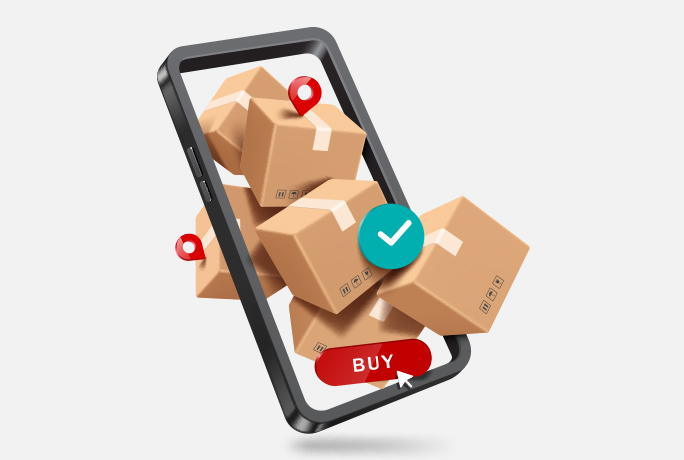Q. How to start an online store in 5 easy steps?

A: In today’s digital age, starting an online store has become a viable option for entrepreneurs and MSMEs (Micro, Small, and Medium Enterprises) looking to expand their reach and tap into a broader customer base. With the right approach and some basic know-how, setting up an online store can be a smooth and rewarding process. Here’s a step-by-step guide on how to begin your online retail journey:
Step 1: Do Your Market Research
Before diving into the world of e-commerce, it’s essential to conduct thorough market research. Identify your target audience, understand their preferences, and research the demand for products in your niche. Analyze your competitors and identify gaps in the market that you can fill. By understanding your market and potential customers, you can make informed decisions about what products to sell online in India.
Step 2: Choose the Right Products
Selecting the right products to sell online is crucial for the success of your store. Consider offering unique and high-demand products that align with your target audience’s interests. Look for suppliers and wholesalers who can provide you with quality products at competitive prices. It’s also essential to consider the logistics of handling and shipping the products to your customers efficiently.
Step 3: Build Your Online Store
Thanks to various e-commerce platforms, building an online store has never been easier. Choose a user-friendly platform that suits your needs and budget. Popular options include Shopify, WooCommerce, and BigCommerce. These platforms offer customizable templates, secure payment gateways, and inventory management features. Ensure your online store design is visually appealing, mobile-friendly, and easy to navigate.
Step 4: Set up Secure Payment Gateways
Offering secure and convenient payment options is crucial to gaining your customers’ trust. Integrate reliable payment gateways that can process various payment methods, including credit cards, debit cards, and digital wallets. Implement SSL certificates to encrypt sensitive data and protect your customers’ transactions.
Step 5: Market Your Online Store
Once your online store is up and running, it’s time to market it effectively. Utilize social media platforms, email marketing, and search engine optimization (SEO) techniques to drive traffic to your store. Engage with your target audience through compelling content, promotions, and discounts. Collaborate with influencers or bloggers in your niche to expand your store’s visibility.
Online MSME Training
For MSMEs that are new to the world of e-commerce, consider enrolling in online MSME training programs focused on e-commerce and online retail. These training sessions can provide valuable insights into market trends, digital marketing strategies, and practical tips to grow your online store. Learning from experts in the field will help you make informed decisions and avoid common pitfalls.
Starting an online store can be a game-changer for your business, opening doors to a vast customer base and increasing sales. With the right products, a well-designed store, and effective marketing strategies, your online venture can thrive in the competitive landscape of e-commerce. Embrace the digital age, and take the leap into online retail to unlock a world of opportunities for your MSME. Some of the benefits of online MSME training are as follows:
- Digital Skills and Knowledge Enhancement: Online MSME training can provide comprehensive learning opportunities in various aspects such as digital marketing, e-commerce, website development, online payment systems, social media management, and more. This enhanced understanding equips MSMEs to make informed decisions and leverage digital tools effectively.
- Cost-Effectiveness: Traditional training programs can be expensive, particularly for small businesses with limited budgets. Online MSME training typically offers cost-effective alternatives as they eliminate the need for physical infrastructure, printed materials, and travel expenses. This makes training accessible to a broader range of MSMEs, regardless of their financial constraints.
- Adapting to Market Trends: The digital landscape is constantly evolving. Staying up-to-date with the latest trends, technologies, and best practices is essential for MSMEs to remain competitive. Online training programs often incorporate the most recent developments, ensuring that businesses learn cutting-edge tactics to expand their online presence.
- Improved Customer Engagement: With online training, MSMEs can learn how to engage customers better through various digital channels. This includes learning how to create compelling content, implement social media strategies, manage customer relationships, and use data analytics to understand customer preferences and behaviour.
- Increased Sales and Revenue: Ultimately, the integration of online training enables MSMEs to harness the power of digital marketing and e-commerce platforms more effectively. By learning to optimize their online presence, they can attract a broader audience, generate leads, and convert prospects into paying customers. This increased online visibility can lead to higher sales and revenue figures.
The Indian government has taken several initiatives to support MSMEs in their transition to the online domain. Some notable efforts include:
- Digital MSME Scheme: The government launched the Digital MSME scheme to encourage MSMEs to adopt digital technologies and online platforms. Under this scheme, financial support and subsidies are provided to help MSMEs invest in digital tools, software, and e-commerce infrastructure.
- Udyog Aadhaar Registration: The Udyog Aadhaar registration process makes it easier for MSMEs to obtain a unique identification number online. This simplifies the registration process and enables them to access various government schemes, benefits, and incentives easily.
- Financial Support for E-commerce Export: To promote online exports, the government offers financial support through various schemes like the Market Access Initiative (MAI) and Market Development Assistance (MDA) Scheme. These initiatives assist MSMEs in reaching global markets through e-commerce platforms.
- Credit Guarantee Fund Scheme: The Credit Guarantee Fund Trust for Micro and Small Enterprises (CGTMSE) provides collateral-free credit facilities to MSMEs. The online portal of CGTMSE enables a smooth application process, making it easier for MSMEs to access credit.
- Technology Upgradation Support: Various schemes, such as the Credit Linked Capital Subsidy Scheme (CLCSS), provide financial assistance for technology upgradation. This helps MSMEs to adopt modern and efficient digital technologies to enhance their competitiveness.